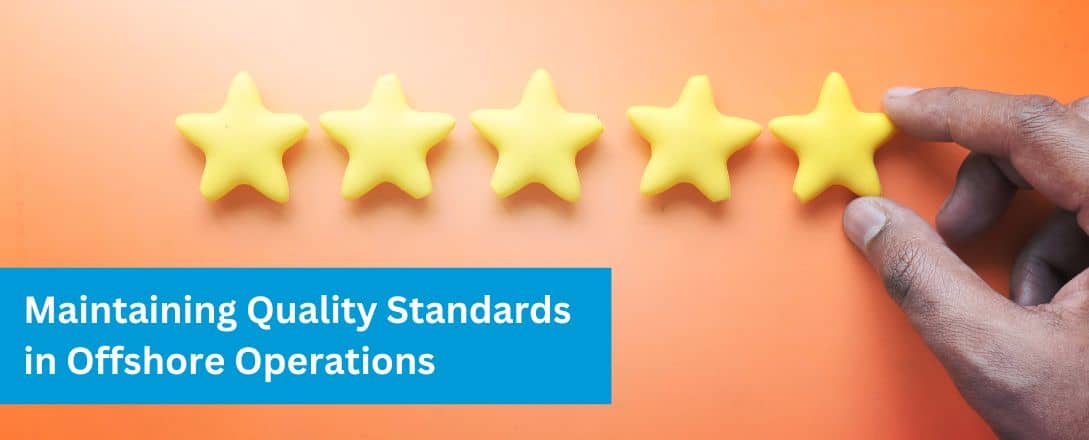Actionable Guides and Tips for Successful
Offshoring to The Philippines
Maintaining Quality Standards in Offshore Operations

Offshoring has become a vital strategy in today’s global economy for companies aiming to enhance operational efficiency, reduce costs, and successfully scale their operations. However, maintaining high standards in offshore operations requires more than simply cutting expenses; it also necessitates a strong commitment to quality, innovation, and seamless integration throughout the outsourcing process. One effective way for businesses to achieve this is by partnering with offshore outsourcing providers in the Philippines like Shore360, which offers the essential infrastructure and systems needed to accomplish these objectives.
This commitment is especially vital in regions such as the Philippines, renowned for its skilled workforce and cost-effective solutions. For businesses to thrive, it is essential to prioritise quality assurance, implement proactive management strategies, and ensure compliance with the ever-evolving standards in their industries. Continue reading this blog for valuable insights that can help you maximise the potential of your offshore operations and develop the capabilities of your Filipino team.
Upholding Excellence in Offshore Business Processes

Operational excellence is fundamental to a successful offshore strategy in the Philippines. Innovations in automation, artificial intelligence (AI), and real-time data empower businesses to establish clear objectives, build strong relationships, and nurture a culture of accountability within their offshore teams. The following key elements and emerging trends are crucial for achieving and maintaining high standards in offshore business operations. Many of these strategies are currently employed by our account managers to assist clients in effectively managing their offshore staff.
Addressing Real-Time Issues and Managing Time-Zone Misalignment
Time-zone differences can pose challenges, particularly in high-pressure situations. To mitigate these issues, it’s essential to implement well-defined escalation protocols that include clear, step-by-step instructions for quickly resolving urgent matters. Using synchronous communication tools, such as Teams and Skype, allows your offshore team to respond in real-time, while establishing designated “overlap hours” creates vital opportunities for collaboration during decision-making sessions. You can adjust these overlap hours according to project phases or deadlines, providing the necessary flexibility to maintain effective communication when it matters most.
If you have established workflow systems with your onshore team, duplicating these processes with your Filipino counterparts can be highly beneficial. At Shore360, we provide customised support to help you seamlessly replicate your existing protocols, offering everything from comprehensive training sessions to ongoing consultations that ensure smooth integration. Through this approach, our clients have experienced significant improvements in quality, efficiency, and overall performance.

Setting Clear Objectives and Performance Metrics
To maximise your offshore partnership in the Philippines, it is essential to set clear objectives and define performance metrics to ensure that your offshore team aligns seamlessly with your business goals. Customising Key Performance Indicators (KPIs) for each department helps create a structured, results-oriented environment that reflects your expectations in real time.
Here are some recommended KPIs to establish with your offshore team:
Error Reduction Rates: Regularly tracking the frequency and severity of errors enables your team to pinpoint specific areas for process improvement, leading to more consistent quality and fewer disruptions. For instance, if recurring issues are identified in a particular process, the team can proactively adjust workflows to reduce errors.
Task Completion Rates: Monitoring the percentage of tasks completed on schedule provides insight into the team’s time management and workflow efficiency. This KPI is particularly important for time-sensitive projects, where delays can affect client satisfaction or project timelines. Setting clear expectations for turnaround times helps offshore teams prioritise their tasks effectively.
Customer Satisfaction Scores: Utilizing tools like the Net Promoter Score (NPS) measures how well the team’s performance meets client expectations, offering valuable feedback for ongoing improvement. High customer satisfaction not only strengthens client relationships but also enhances your brand’s reputation, positively impacting your business.
Attendance and Reliability: Attendance is a crucial KPI for offshore teams, as consistent presence and availability are vital for implementing action plans and fulfilling (SLA) service-level agreements. By establishing clear expectations around attendance, you ensure a reliable and accountable team that is prepared to support your business operations as needed.

Leveraging Predictive Analytics in Quality Control
Predictive analytics introduces a proactive approach to quality control, enabling you to identify potential issues before they arise. Unlike traditional performance metrics, which tend to be reactive, predictive analytics provides insights that allow you to prevent errors, optimise processes, and enhance customer satisfaction in advance. Here’s how predictive analytics can give your offshoring strategy a competitive advantage:
- Preemptive Error Detection: Predictive analytics enables you to identify areas where errors are likely to occur based on historical data and trends, allowing your team to address potential issues before they impact service quality.
- Optimised Training and Resource Allocation: By pinpointing specific skills or process areas needing improvement, predictive analytics supports targeted training initiatives, ensuring that resources are allocated where they are most needed. This leads to a more skilled and efficient team aligned with your business standards.
- Proactive Quality Assurance: Instead of waiting for errors to emerge, predictive tools provide continuous oversight and allow for real-time adjustments, ensuring that your offshore team’s output remains reliable and of high quality. This proactive strategy ultimately reduces rework, enhances customer satisfaction, and supports smooth operations.

Utilising AI-driven tools for predictive analytics can significantly improve quality control in your offshore operations. Here are some notable platforms to consider:
- H2O.ai: This open-source machine learning platform offers advanced AI capabilities and is known for its speed and flexibility in building predictive models. It supports automated machine learning (AutoML) and integrates with various programming languages, making it ideal for companies that require rapid model deployment and AI-driven predictions.
- DataRobot: This platform provides automated machine learning, allowing users to develop and deploy models with minimal coding. Its AutoML feature assists non-experts in creating predictive models, making it a great choice for businesses seeking AI-powered solutions without needing extensive technical expertise.
- SAP Analytics Cloud: Combining business intelligence, planning, and predictive analytics, this cloud-based platform employs AI and machine learning to uncover hidden data relationships and generate actionable insights. It features augmented analytics and seamless integration with third-party solutions, streamlining analytics and planning processes.
- IBM Watson Studio: This cloud-based data science and machine learning platform includes predictive analytics capabilities. Users can build and deploy predictive models using a visual interface or coding languages such as Python, Scala, and R, facilitating decision optimisation.
- RapidMiner: Offering a comprehensive suite of products for data preparation, machine learning, and model deployment, RapidMiner is designed for rapid prototyping and supports a wide range of machine learning models, making it suitable for businesses looking to quickly develop and test predictive analytics solutions.
Implementing Effective Quality Control Measures

Maintaining the same standards with offshore teams as with onshore ones is essential for establishing a successful offshoring partnership. Here are several strategies to help achieve consistent quality and alignment with your expectations:
- Conduct Regular Audits for Quality Assurance: Performing regular audits is vital for evaluating the performance of your offshore team and ensuring it meets your quality benchmarks. By conducting quarterly reviews, you can track key metrics such as accuracy, productivity, and customer satisfaction. For instance, if discrepancies in task accuracy occur, a quarterly audit can help pinpoint these issues early, allowing for timely adjustments to processes. This approach fosters transparency and accountability, creating a reliable framework for your offshore operations.
- Prioritise Training and Development: Continuous training is crucial for keeping your offshore team competitive, adaptable, and aligned with industry best practices. Investing in professional development can have a significant positive impact on performance; for example, one our clients, a healthcare provider reported a 25% reduction in data entry errors after implementing specialised training. By focusing on development, you ensure your offshore team stays updated with industry trends, maintains essential technical skills, and contributes effectively to your business objectives.
- Apply Technology in Quality Control: Leveraging AI and automation tools can streamline quality control processes, minimising manual errors and enhancing data accuracy. Automation tools, such as task management software and real-time tracking systems, empower your offshore team to operate efficiently while maintaining data security standards. This not only improves operational quality but also ensures compliance with regulatory requirements, providing peace of mind in today’s data-sensitive landscape.
Best Practices for Consistent Quality in Offshore Operations

Maintaining high-quality standards in offshore operations necessitates a combination of clear communication, effective leadership, and well-considered incentives. Below are best practices to help you cultivate a high-performance offshore team that aligns seamlessly with your onshore objectives:
- Establish Transparent Communication Channels: To avoid misunderstandings and address issues promptly, implement real-time communication tools such as Slack or Microsoft Teams for both your onshore and offshore teams. These platforms facilitate immediate feedback and proactive adjustments, ensuring that minor issues do not escalate into larger problems. Regular check-ins—whether daily or weekly—help both teams stay aligned on quality objectives and respond swiftly to changing client needs.
- Foster Strong Leadership and Accountability: Effective leadership in offshore settings is crucial for upholding consistent standards. Consider adopting management frameworks like Objectives and Key Results (OKRs) to set clear goals and track progress. Additionally, agile retrospectives provide offshore teams with opportunities to reflect on their performance and identify areas for improvement. By empowering offshore leaders to take ownership of quality control, you create a proactive environment where accountability is a fundamental part of daily operations.
- Implement Recognition and Incentive Programmes: Recognition serves as a powerful motivator for offshore teams, promoting sustained quality. Introduce performance-based incentives, such as a “Quality Excellence” award or peer-nominated recognitions, to celebrate achievements and reinforce the importance of quality standards. Customised recognition programmes aligned with your offshore goals can boost morale, encourage high performance, and cultivate a culture of excellence across teams.
- Align Onshore and Offshore Teams: Unified objectives between onshore and offshore teams foster a cohesive and efficient workflow. Tools like Monday.com and Asana facilitate real-time tracking and adjustments, enhancing transparency and promoting collaboration. Additionally, consider organising virtual team-building activities, such as virtual coffee breaks or mentorship programmes, to strengthen relationships and create a supportive environment where onshore and offshore team members work together towards shared goals.
Future-Proofing Offshore Quality Standards
To maintain quality and remain competitive in offshore operations, it is crucial to implement strategies that adapt to industry changes and meet rising expectations. Two key approaches—upskilling and adopting Environmental, Social, and Governance (ESG) practices—can help establish a resilient and forward-thinking offshore framework.
- Upskilling Programmes: Investing in continuous training, such as data analytics or relevant industry software, empowers your offshore team to effectively meet evolving market demands. By tailoring these programmes to address emerging trends, you ensure that your team remains agile and capable of delivering high-quality results that keep pace with advancements in your industry.
- Integrating ESG Principles: Incorporating ESG practices into offshore operations resonates with today’s socially conscious clients. Emphasising sustainable practices, including ethical labour standards and environmentally friendly operations, enhances your brand’s credibility while building trust with clients who prioritise responsible business practices. By positioning your offshore team in alignment with these principles, you support long-term growth, strengthen client loyalty, and ensure adaptability to future market demands.
These strategies empower you to stay ahead in an increasingly dynamic landscape, cultivating an offshore team that is not only skilled but also aligned with global values and prepared for sustainable success.
Conclusion

To achieve and sustain high-quality standards in offshore operations, companies must implement a strategic combination of goal-setting, technology integration, cultural awareness, and ongoing skill development. Organisations that take a proactive stance on quality management by creating clear communication channels, appreciating team contributions, and remaining flexible to industry trends can establish a robust foundation for effective offshore partnerships. By continuously refining their strategies and adapting to market changes, businesses can ensure consistent quality, enhance client trust, and cultivate offshore relationships that contribute to enduring success.
Learn how you can start a strategic and quality-oriented offshoring in the Philippines at https://www.shore360.com/implementation/

